|
Incoming LLM Students Look to Build Upon First-Year
Successes of Program
In the 2002-03 academic year, the Master
of Laws (LLM) program in Law, Science & Technology
proved itself a great new addition to Stanford
Law School.
Students in this program come to Stanford to undergo a year of rigorous
academic and professional training in legal practice and interdisciplinary
analysis related to current developments in law, science and technology,
including such areas as e-commerce, jurisdiction and dispute resolution
in cyberspace, biotechnology and health science issues, intellectual
property regimes and contractual developments related to the global
information economy. Some members of our first graduating class
have moved on to work for U.S.-based law firms or technology companies,
while others have decided to apply their new expertise by continuing
on career paths with previous employers.
This April, after a long and selective admissions process, ten
new students were selected to participate in the 2003-04 LLM program.
The admissions committee was fortunate to receive applications from
some of the most talented young professionals from around the globe.
Program directors seek out a diverse group of the best and brightest
technology lawyers who wish to further their professional training
by entering our LLM program. The incoming group of students
reflects a wide array of experiences, interests and professional
specializations. Drawn from eight different countries and
four continents, our new students include attorneys at international
law firms who specialize in IP and technology law, owners and in-house
counsel of tech-based corporations, attorneys who have worked in
the public sector for technology and science-related agencies, and
scholars involved in the legal research and training that surrounds
such issues.
For more information about the LLM program in LST, please visit
our website at:
http://www.law.stanford.edu/admissions/adv/lst/
Below, please find a brief biography of each of the selected
candidates, followed in some cases by a short interview:
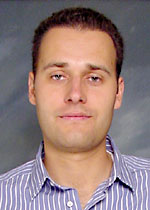 |
Oliver K. Breme, from Germany, studied
law at the Rheinische Friedrich-Wilhelms-University of Bonn,
where he also worked in the cyberlaw research center.
He received a doctorate from the University of Bonn
for his thesis on liability in the field of IT security and
digital signatures. Oliver has lectured on IT/IP law,
privacy law, environmental law and criminal law at private
education institutions.
His professional training includes work for a San
Francisco law firm and a major
role in the establishment and operation of one of Germany’s first
certification authorities for digital signatures and encryption.
He has contributed significantly both to the development of
the German digital signature act and to the integration of
the respective European legislation. Oliver has acted
as a legal and technical expert for German and European committees,
offering numerous presentations on IT security, public key
infrastructures (PKI), smartcards and cryptology. Until
recently, this LLM candidate was in-house counsel for Element
5, a leading e-sales distributor of the products of over 5,000
international software companies. Oliver is a member
of the German-American Lawyers’ Association (GALA).
Oliver,
why did you choose to get your LLM from Stanford Law?
I believe that the unique combination of an extraordinary
faculty, small
classes, a very focused program with a strong technological
orientation,
a highly dedicated staff, and the proximity of the Silicon
Valley is a huge
asset. If you add the beautiful campus, the fellow students
from all
over the world and the Californian way of living and learning,
you sure
get a truly magnificent combination.
|
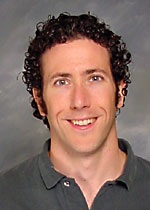 |
Daniel Debow is from Toronto, Canada.
He earned an LLB and an MBA from the University of Toronto (with
a focus on corporate law, law and economics, and finance), and
a BA in psychology from the University of Western
Ontario. While still
in law school, Daniel co-wrote the business plan for an enterprise
software firm called Workbrain, and upon graduation he promptly
joined this company, taking on a variety of legal and operational
responsibilities. He has developed standard license and
services contracts, negotiated commercial contracts, and established
HR and sales operations functions. Daniel’s work has enabled
Workbrain to grow to 265 employees and become one of the top
30 software firms (by revenue) in Canada.
He now serves as Vice President of Marketing, leading a team
in market analysis and strategy, product marketing, demand generation,
sales support and media/analyst relations.
Daniel has been a summer associate at Goldman Sachs in London and at
Sullivan & Cromwell in New York.
His academic interests thus lie at the intersection of technology,
business and the law. He is particularly interested
in the effect of private contracting on the rate of technology
adoption, the impact of enterprise software on the nature
of the firm, and judicial choices that result in national
differences in productivity.
Daniel, you've been in the LLM program for a few weeks now.
how is it going?
The first
few weeks here have been fantastic. Every day is one
of
discovery - a new corner of this amazing campus, a new friend,
or a great
new class. I’ve been completely impressed with how approachable
and
interested the faculty are. It’s obvious that they enjoy
working with the
LLM students. So far, so good!
|
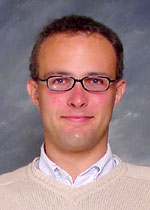 |
Frederic Debusseré, from Belgium, earned
his law degree from the Catholic University of Leuven, Belgium.
He studied as an exchange student at Northwestern University
School of Law in Chicago. He is
currently a researcher at the Interdisciplinary Centre for Law
& Information Technology of the Catholic University of Leuven,
where he teaches in the LLM European Legal Informatics
Study Programme.
Frederic is also a junior associate with the Brussels-based
international law firm Stibbe. His practice at Stibbe
touches on a wide variety of IT-related issues, including
e-commerce, personal data protection (and digital privacy),
electronic signatures, domain names, Internet service provider
liability, and hardware/software outsourcing contracts.
He is the author of several publications and has spoken at
a number of conferences on IT law issues.
Frederic,
what is the most important legal issue in the field of technology
law facing your country today?
Important
technology law issues facing Belgium today include dealing
with the recent E-Commerce Act of March 2003, the Anti-Spam
Act of May 2003 and the Illicit Domain Name Registration Act
of June 2003, as well as transposing the EU Directive on Privacy
and Electronic Communications of July 2002 timely, i.e. by
October 31, 2003.
|
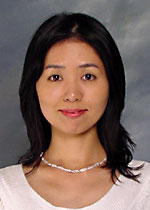 |
Miyuki Hanai, from Japan, earned
an LLB from the University of Tokyo.
There, her coursework focused on commercial code, civil law,
and the practice of international business law. While
working towards the LLB, she also joined the Legal Aid Service
of the University of Tokyo, a pro
bono legal counseling service.
Miyuki has since been working as an associate attorney with
the Law Offices of Anderson Mori. She has had opportunities
to work on wide-ranging legal matters for both Japanese and
overseas clients, delving into IP, cross-border mergers and
acquisitions, litigation (including the deposition of a U.S. litigation
held in Japan), and
more general corporate matters such as structured finance.
In one case, she dealt with a civil action to obtain trademark
and in the process assisted a professor in his preparation
of a legal opinion to support her claim. She has
also handled a patent infringement, and taken part in negotiations
regarding research and development agreements. In her
spare time, Miyuki participates in IP study groups inside
and outside the context of her practice.
|
 |
Rodrigo Orenday Serratos earned his LLB
degree from the Escuela Libre de Derecho in Mexico
City, where he participated in the Phillip
C. Jessup International Law Moot Court Competition. He
has also received postgraduate diplomas in Intellectual Property,
International Financial Law, Democratic Governance, and International
Business Law from the aforementioned school. With this
strong corporate background, Rodrigo is able to serve the Mexican
Central Bank by working on arbitration, the negotiation of international
treaties and contracts, the establishment of subsidiary financial
institutions and representative offices, as well as intellectual
property matters. Other areas of interest and engagement
include the process of legal reform (primarily concerning freedom
of information), settlement systems, electronic signatures,
and personal data protection.
|
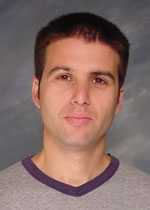 |
Ohad Mayblum, from Israel, earned
his LLB from the University of Haifa, where
he also earned a BA in economics. Ohad has been working
as an associate at Eitan, Pearl, Latzer & Cohen-Zedek, Israel’s largest
technology-oriented law firm. He practices intellectual
property litigation, licensing, and employment law. He
has represented numerous multinational technology companies
in deals in Israel and has
provided intellectual property counsel to international and
domestic companies. Ohad has authored a number of publications
and given presentations on issues dealing with employment law,
e-commerce transactions, intellectual property law, and privacy
law.
|
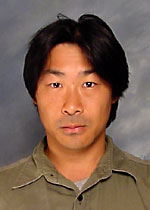 |
Takatoshi Monya is from Japan, and
he earned his LLB from the University of Tokyo.
As an associate with Nishimura & Partners, one of Japan’s largest
law firms, Takatoshi practices in many different legal areas.
He has worked on both finance law, litigation, and both domestic
and international corporate law. His work on litigation has
involved a special emphasis on matters of intellectual property.
In 2002 Takatoshi took leave from Nishimura & Partners and
began serving as Deputy Director of the IP Policy Office at
the Japanese Ministry of Economy, Trade, and Industry.
In doing so, he became the first Japanese lawyer to work as
a government official and to take direct involvement in the
reform of Japanese IP legislation. Takatoshi drafted
amendments to the Unfair Trade Competition Law and researched
legal structures to be used to facilitate IP securitization
in Japan.
Previous to working for the Japanese government, Takatoshi had
studied IP law intensively at the University of Washington and conducted
research on IP law at the Max Planck Institute in Munich.
During his professional career, Takatoshi has also authored
various papers and lectured on issues dealing with IP law
and finance law. Outside the office, he has competed in full-contact
karate.
|
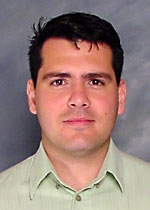 |
Carlos Motta, from Brazil, earned
his LLB from the Faculdade de Direito da Universidade Mackenzie
in 1999. In 2000, he was a guest student in the graduate
program of E-Commerce at the Faculdade de Direito do Largo São
Francisco (USP/SP). Carlos is currently an associate with
the firm Souza, Cescon Avedissian, Barrieu e Flesch, where he
practices in the areas of Corporate Law (primarily Mergers &
Acquisitions) and IT Law. Previously, Carlos was fortunate
to have worked with two of the most prominent Brazilian law
firms (Machado, Meyer, Sendacz e Opice; and Goulart Penteado,
Iervolino e Lefosse, associated with Linklaters). As an academic,
he has authored numerous publications and given presentations
on a variety of issues related to IT Law. He is also the cofounder
and general coordinator of the Brazilian Centre of Internet
Legal Studies (www.cbeji.com.br). As the premier Internet legal
resource in Brazil, the
site provides articles, legislation, jurisprudence, and news
related to internet law in Brazil and abroad.
Since 2001, Carlos has been a member of the Computel Law Association.
|
 |
Hideto Niioka, from Japan, is a
graduate of the Ludwig-Maximilian University in Munich, Germany.
He specialized in tax law (Fachanwalt für Steuerrecht) and engaged
in research experiences at the University of Valencia, Spain, before
finishing his doctoral thesis, entitled “Clinical Trials in
Patent Law – A Comparative Study in Europe, Japan and U.S.”
Later, he worked as a fellow and research assistant for Prof.
Dr. h.c. Josef Straus at the Max Planck Institute for Intellectual
Property Law, Unfair Competition and Tax Law.
Hideto is currently an associate at the Frohwitter Intellectual
Property Counsellors law firm, where he practices as one of
the few Japanese-German Attorneys-at-Law in Europe.
Working for North American, Latin American, Asian, and European
clients, his experiences at Frohwitter are particularly focused
on patent law. Hideto analyzes litigation, licensing
(in support of technical standardization), the diligence of
IP portfolios in healthcare and mobile telecommunication technology
fields, pharmaceutical regulatory affairs, IP as assets for
M&As, and corporate law. He has worked to devise
M&A deal structures, and participated in the drafting
and negotiation of major corporate transactions.
|
 |
Ji-Hyun Park, from Korea, earned
her LLB from Yonsei University in Seoul, where
she also obtained her Masters in Civil Law with a concentration
in Property Law. She is currently serving in the World
Intellectual Property Organization (WIPO) as a member of the
legal staff in their Arbitration and Mediation Center. She
has substantial experience in administering domain name disputes
and she has also spent a large part of her career managing arbitration
cases for international IP disputes, especially those concerning
license agreements and distribution contracts. Ji-Hyun
has spoken at several conferences on Digital Copyright in E-Commerce
transactions.
Ji-Hyun, how do you hope the LLM Program in Law,
Science & Technology will contribute to your professional
legal training?
It will
broaden my horizon, giving me an opportunity to learn about
global issues as well as those important in the U.S.
It will help me to see the bigger picture of what I have been
doing, and see what future prospects can be explored from
the academic point of view.
|
|










